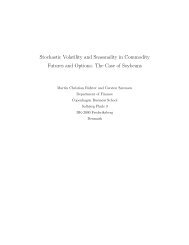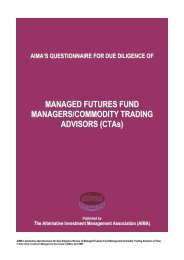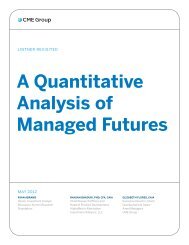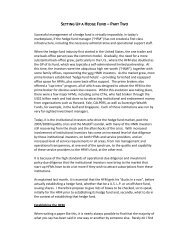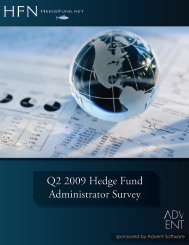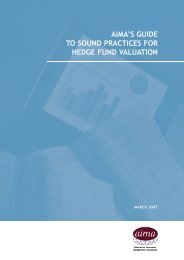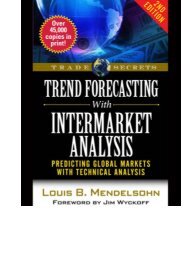Chicago Board of Trade - Interconti, Limited
Chicago Board of Trade - Interconti, Limited
Chicago Board of Trade - Interconti, Limited
You also want an ePaper? Increase the reach of your titles
YUMPU automatically turns print PDFs into web optimized ePapers that Google loves.
Four Benefits <strong>of</strong> Managed Futures<br />
Managed futures, by their very nature, are a<br />
diversified investment opportunity. Trading advisors<br />
have the ability to trade in over 150 different<br />
markets worldwide. Many funds further diversify<br />
by using several trading advisors with different<br />
trading approaches.<br />
The benefits <strong>of</strong> managed futures within<br />
a well-balanced portfolio include:<br />
• opportunity for reduced portfolio volatility risk<br />
• potential for enhanced portfolio returns<br />
• ability to pr<strong>of</strong>it in any economic environment<br />
• opportunity to participate easily in global markets<br />
1. Reduced Portfolio Volatility Risk<br />
The primary benefit <strong>of</strong> adding a managed futures<br />
component to a diversified investment portfolio is<br />
that it may decrease portfolio volatility risk. This<br />
risk-reduction contribution to the portfolio is possible<br />
because <strong>of</strong> the low to slightly negative correlation<br />
<strong>of</strong> managed futures with equities and bonds. One<br />
<strong>of</strong> the key tenets <strong>of</strong> Modern Portfolio Theory, as<br />
developed by the Nobel Prize economist Dr. Harry<br />
M. Markowitz, is that more efficient investment<br />
portfolios can be created by diversifying among<br />
asset categories with low to negative correlations.<br />
Table 1 compares the correlations between<br />
managed futures, bonds, and domestic stocks<br />
from January 1995 through December 2004. As<br />
you can see, managed futures are essentially<br />
uncorrelated to the other asset classes.<br />
Table 1: Correlation <strong>of</strong> Selected Asset Classes 1995-2004*<br />
Managed<br />
Futures Bonds U.S. Stocks<br />
Managed Futures 1 1.00<br />
Bonds 2 0.41 1.00<br />
U.S. Stocks 3 -0.11 -0.10 1.00<br />
Source: The Barclay Trading Group, Ltd.<br />
*Based on monthly data from 1995-2004<br />
1<br />
Managed Futures: Barclay CTA Index<br />
2<br />
Bonds: Lehman Brothers Long-Term U.S. Treasury Index<br />
3<br />
U.S. Stocks: S&P 500 Total Return Index<br />
2. Potential for Enhanced Portfolio Returns<br />
While managed futures can decrease portfolio<br />
risk, they can also simultaneously enhance overall<br />
portfolio performance. For example, chart 1 shows<br />
that adding managed futures to a traditional<br />
portfolio improves overall investment quality. This<br />
is substantiated by an extensive bank <strong>of</strong> academic<br />
research, beginning with the landmark study <strong>of</strong> Dr.<br />
John Lintner <strong>of</strong> Harvard University, in which he wrote<br />
that “the combined portfolios <strong>of</strong> stocks (or stocks<br />
and bonds) after including judicious investments…<br />
in leveraged managed futures accounts show<br />
substantially less risk at every possible level<br />
<strong>of</strong> expected return than portfolios <strong>of</strong> stocks<br />
(or stocks and bonds) alone.” 1<br />
Table 2 shows that when viewed as an<br />
independent investment, managed futures have<br />
compared favorably with U.S. stocks and bonds,<br />
as well as international stocks, in 2003 and 2004.<br />
1<br />
Lintner, John, “The Potential Role <strong>of</strong> Managed Commodity Financial Futures Accounts (and/or Funds) in Portfolios <strong>of</strong> Stocks and Bonds,”<br />
Annual Conference <strong>of</strong> Financial Analysts Federation, May 1983.<br />
2


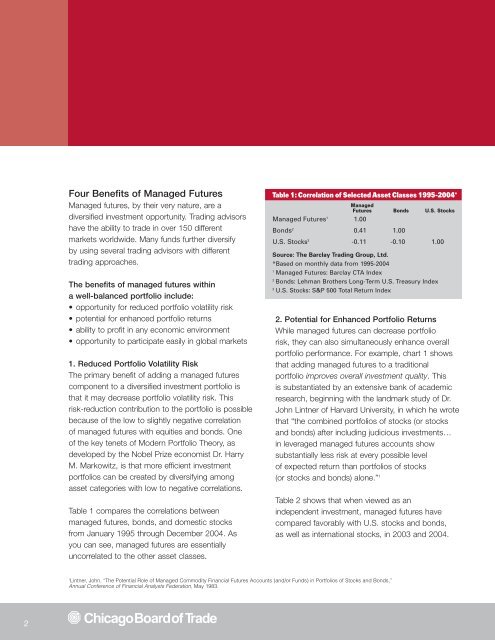
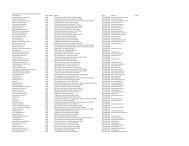
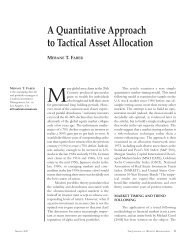
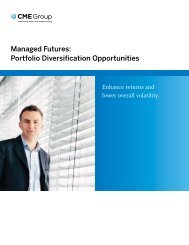
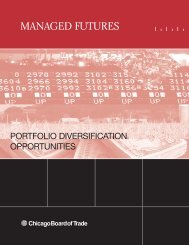
![Definitions & Concepts... [PDF] - Cycles Research Institute](https://img.yumpu.com/26387731/1/190x245/definitions-concepts-pdf-cycles-research-institute.jpg?quality=85)
